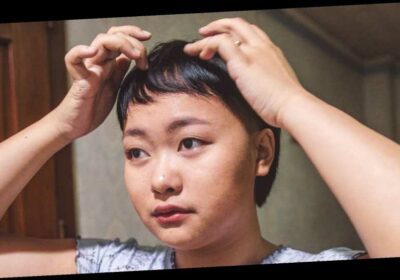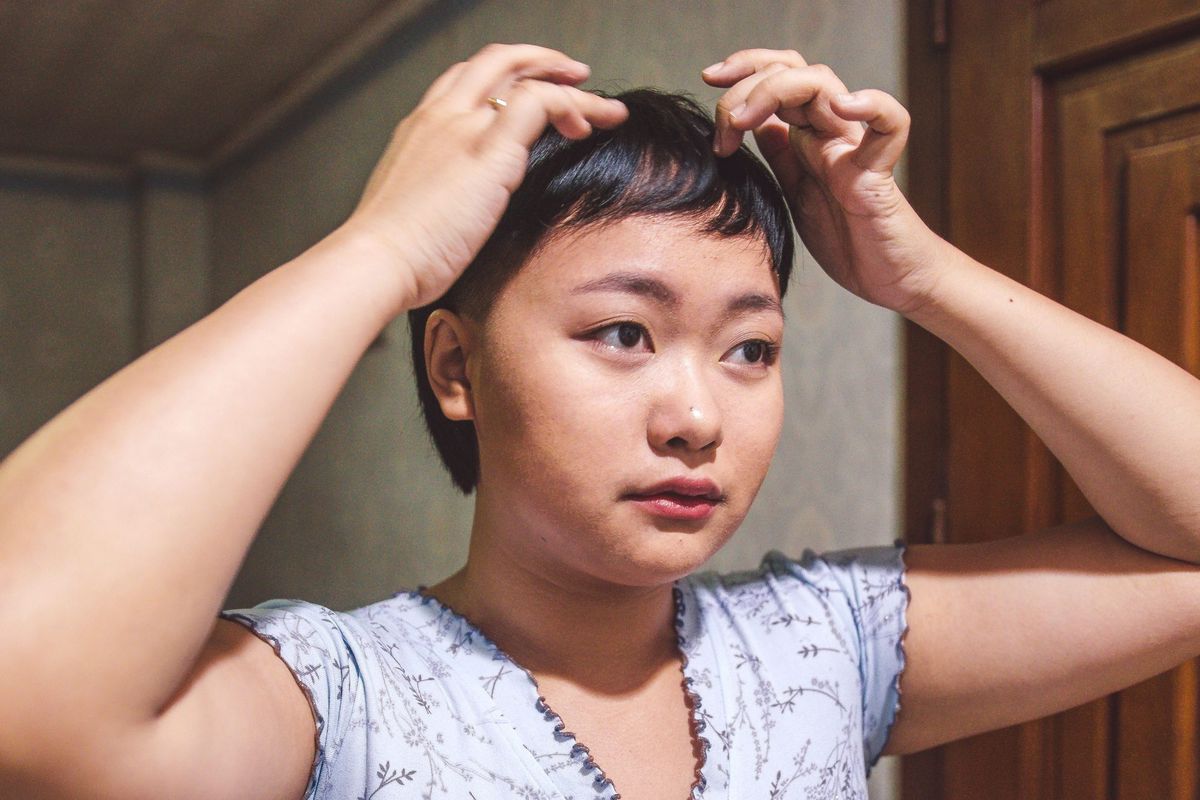Can This Holy Grail Skincare Ingredient Help With Hair Loss?

The benefits of including retinol in your skincare routine are unrivaled. Dermatologists regularly recommend the ingredient because it treats a number of common skincare concerns, from fine lines and wrinkles to acne. But, can vitamin A's ability to jumpstart skin cells' renewal process do the same for your hair?
One haircare brand thinks so. Monpure, a UK-based brand that focuses on scalp health has included retinyl palmitate, the least irritating retinoid, in its Follicle Boost Hair Density Serum. This product works to improve cell turnover (that's where the retinyl palmitate comes in) to clear the scalp of buildup that can stunt hair growth, block a DHT-releasing enzyme that can lead to hair loss, and make hair look thicker and fuller.
"The skincare industry up until now has kept this ingredient to themselves and so the transformative effects it can have on the scalp and hair growth is seldom spoken about amongst consumers," says Dr. Sue Ann Chan, Monpure's resident dermatologist. "However, consumers are now beginning to understand that like the skin on your face, the scalp needs to be well cared for to function at its best. The scalp plays a crucial role as an incubatory environment for pre-emergent hair growth, directly impacting the quality of the hair once it starts to appear."
To get more info on the science behind how retinol can help support hair growth, I checked in with New York City board-certified dermatologists Dr. Michele Green and Dr. Debra Jaliman. Just FYI, both dermatologists have no affiliation with the brand.
Can Retinol Make Hair Grow Faster?
A 2007 study found that retinol can help prolong the growth stage (the anagen phase) of the hair cycle when combined with minoxidil, the active ingredient found in Rogaine, one of the most popular over-the-counter hair loss treatments.
"The reason I recommend retinol to patients with hair loss is to increase the penetration of the minoxidil they are using," says Dr. Jaliman. The MD points out studies have proven that retinol can make minoxidil work better, but more research needs to be done on vitamin A used alone.
Dr. Green adds that overall scalp health is important when treating hair loss, in addition to using prescribed or over-the-counter treatments. "Using retinol on the scalp can help maintain a healthy scalp, which will in turn facilitate hair growth," she explains. "Scalp health is also contingent upon external as well as internal factors. The hair follicles need the right nourishment and the scalp also needs to maintain the right pH balance for hair to grow."
Can You Use Retinol Serums for Your Face on Your Scalp?
When used for hair loss, retinol might not jive with the scalp's pH level. So it's important to maintain a healthy scalp in order to create the optimal environment for hair growth.
The pH level aids in the barrier function of the epidermis and protects the hair follicles," says Dr. Green. "The scalp should maintain a pH between 3.5 to 5.5. Products which are too alkaline deplete the scalp of its natural oils and can make the scalp too dry. Retinol naturally has a ph of approximately 5 to 6 therefore some individuals may benefit from using retinol on the scalp."
While there are hair serums formulated with retinol, Dr. Jaliman says you can use a regular retinol serum as well. If want to try retinol as your sole treatment, just remember there isn't a ton of research available on whether it's effective on its own.
VIDEO: When You Apply Sunscreen in Your Skincare Routine Actually Matters A Lot
What Are the Side Effects of Using Retinol On Your Scalp?
Some bad news: the side effects of using retinol on your face go for your scalp, too.
"You can experience sensitivity, redness, and irritation, which can make the situation worse resulting in hair loss or thinning," Dr. Green explains. "The same holds true with regards to sensitivity. If you have a sensitive scalp, you should stay clear of using any form of retinol on your scalp."
Since retinol can make the scalp more sensitive, Dr. Green suggests using a spray on sunscreen to prevent sun damage. The MD also points out that those with scalp psoriasis, eczema, or dermatitis should consult with a dermatologist before using retinol on the scalp.
If you're experiencing extra flaking (also known as the retinoid uglies), Dr. Jaliman says you may want to use a zinc pyrithione shampoo (like Head & Shoulders) to reduce dandruff and help it penetrate better.
What Other Haircare Products Should I Be Using?
Since retinol can be drying, it's important to keep the scalp hydrated. Dr. Green calls out leave-in conditioners that are free of mineral oils and parabens, or oils like rosemary, argan, and tea tree. "Using these oils three to four times weekly on your scalp will keep it healthy and moisturized resulting in healthy hair growth and less breakage," she says.
Co-washing is another great option, especially if you have color-treated hair since it's less likely to strip of the scalp of its natural oils.
Finally, be gentle when styling hair. "When combing or detangling your hair, you should use a special detangling comb or brush," Dr. Green says. "Apply minimal heat when styling color-treated hair and use protective styling products such as heat protector to hair before blow drying."
Source: Read Full Article
